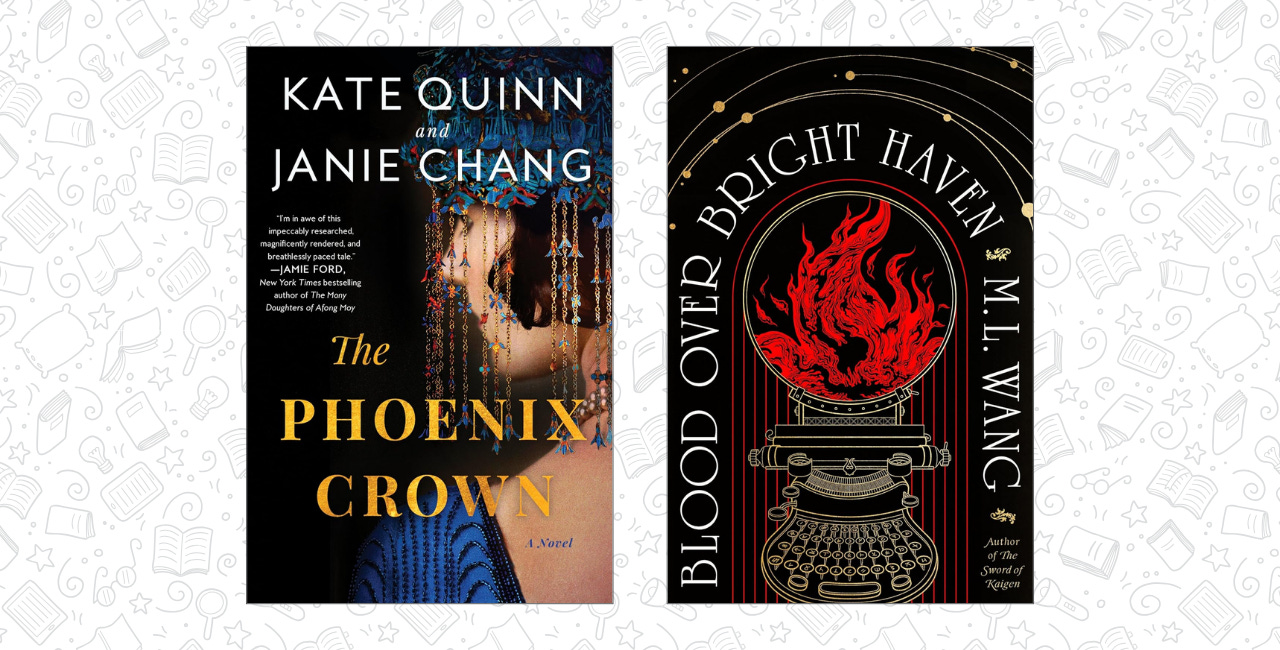November 2024 Reading Recap
My surprising and unofficial participation in Nonfiction November...
As I am writing this, we are just 10 days from Christmas. That feels absolutely bananas to me — having only three weekends between Thanksgiving and Christmas is a tough way to end the year. Minnesota has hit a cold snap and is losing sunlight every day, so I am hunkering down and trying to embrace twinkle lights and coziness. But I’m not going to lie… it’s been hard. My energy is low, and my spirits are not as sparkly as I wish they were.
In terms of reading, I unintentionally celebrated Nonfiction November last month by finishing four nonfiction books — I think the highest number in a single month this year! It was good to stretch that muscle a bit, although it’s clear I’m a little out of practice based no how hard it was to write some of these blurbs. Here’s what I read:


📘 The Phoenix Crown by Janie Chang and Kate Quinn
An aspiring soprano and a Chinese embroideress both become involved with a charming railroad magnate in 1906 San Francisco. When the devastating earthquake hits, their fates are further intertwined over the mysterious disappearance of a legendary Chinese relic. I always save Kate Quinn books for vacation, so it felt right that I finished this one while I was traveling early in the month. Her plots are intricate but well-paced, and she does an amazing job writing believable women in memorable circumstances. Her partnership with Janie Chang was seamless, and made for a story that spanned cultures and stories. I loved this one a lot.
📘 Blood Over Bright Haven by M.L. Wang
When Sciona becomes the first female highmage, she hopes for the opportunity to do research with the respect of her male peers. With the help of her assistant, and without the support of her colleagues, she uncovers a deep conspiracy at the heart of the magic that keeps Bright Haven running and will change the course of magic forever. This reminded me a lot of Babel by R.F. Kuang, in the way that magic and education are a way to explore colonialism and systems of power. The early chapters were a bit dense for my tastes (I just skim over long explanations of magical theory), but really picks up as Sciona starts to unravel the systems of power in play. It’s very dark, but very, very good.
📘 Bite by Bite: Nourishments and Jamborees by Aimee Nezhukumatathil
In addition to nourishing us, food comes with associations, stories, and emotional flavors that color everything we eat. In this collection of short essays, poet Aimee Nezhukumatathil writes about her many encounters with food and explores how it influences our experiences, identities, and history. I liked her 2020 essay collection World of Wonders better, but this is still top tier – a foodie in your life will probably love it.
📘 Ducks: Two Years in the Oil Sands by Kate Beaton
To pay off her student loans, Kate Beaton moved to Alberta to take advantage of the oil rush. For two years she chronicled her personal experience as a young woman in an almost exclusively male environment, where trauma is a common and unacknowledged way of life. I thought this one was great, especially as a companion to another book I read this year, Fire Weather: A True Story from a Hotter World by John Vaillant. Both take place in and around Fort McMurray, the hub of Canada’s oil industry, but provide very different perspectives. Beaton’s memoir gives a great look into working at a fracking facility, while Fire Weather provides border context about the oil industry's impact on our changing climate. I enjoyed reading these two different but equally important stories. Kate Beaton is excellent!
📘 Wild Girls: How the Outdoors Shaped the Women Who Challenged a Nation by Tiya Miles
Getting outside for a “stupid little walk for our stupid mental health” is a funny meme, and also not the only benefit a relationship with the outdoors brings. In this slim little book, historian Tiya Miles shares stories of revolutionary girls who embraced the outdoors throughout history. She writes about women across cultures and experiences, and shows how a relationship with the outdoors led to independence, resourcefulness, and vision. This one packs a lot of history into a tiny book, but it was a lovely read arguing for the importance of access to wild spaces.
📘 Art of the English Murder: From Jack the Ripper and Sherlock Holmes to Agatha Christie and Alfred Hitchcock by Lucy Worsley
While true crime is definitely trending now, fascination with murder has a long, long history in many cultures. This book looks specifically at the British fascination with murder, tracing it through cultural artifacts like plays, novels, paintings, poetry, and journalism. It’s a meandering little book, but really gives an interesting high-level look at our fascination with crime and punishment.
Final Thoughts
The end of the year always makes me think back where I’ve been and where I want to be going. Looking back, I am still on track to complete my single reading goal — read 24 backlist books I already own. That feels very satisfying!
Looking ahead, I am brainstorming new reading goals for 2025. Setting a single goal was nice, so I probably will adopt that strategy again next year. But there are so many options for what it could be! Some things I am considering are:
A goal around making sure I am reading diverse authors.
A goal around continuing to read my existing shelves.
A goal about reading new books I purchase.
A goal about reading more nonfiction.
A goal about reading new or more diverse genres.
Have you thought about any reading goals for next year? What are you excited to read before the end of 2024? Or first thing in 2025?





